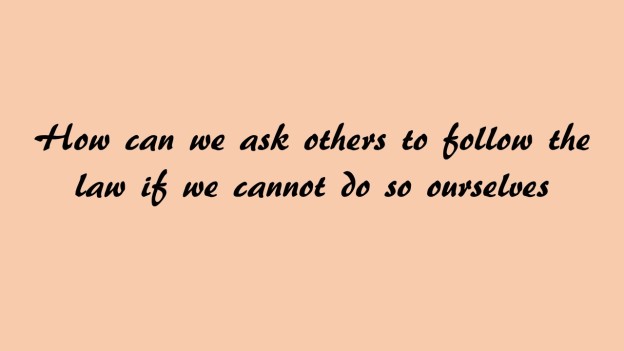The President’s UN speech, 2016
I listened to President Obama’s speech at the UN. There, he talked about a liberal political order, respect for human rights and the rule of law. These are essential for solving many of the problems we see in the world today.
But here is my problem with that assertion. How can we ask others to follow the rule of law if we are incapable of doing so ourselves? Many have correctly pointed out the huge income disparity in the US. The 99% of those left behind believe the 1% is above the law. Some current events reinforce this perception.
The Problem with Wells Fargo
Over a period of five years, low-paid workers at Wells Fargo were encouraged to open phony accounts and charge fees. Share prices of Wells Fargo rose due to the “cross-selling”, and upper management got big bonuses. When the scam was reported, 5300 low-wage workers were fired. But John Stumpf, the CEO, kept his job and perks. Carrie Tolstedt, the banking chief who supervised this crime, was allowed to retire with over 100 million in company stock. There is now talk of forcing them to forfeit a small fraction of their stock awards. Net result: low level workers got fired, their bosses made a lot of money.
Wall Street in 2008
Another example that still rankles:
In 2008, we had the most serious financial crisis since the great depression. Yet, none of the leaders of the ‘too-big-to-fail’ banks whose activities precipitated the crisis was ever brought to justice. What terrorizes me most is not a masked terrorist with a gun but losing my hard-earned nest egg in the next market crash engendered by captains of our financial system, a nightmare scenario for retirees.
Dissonance and the rise of ‘The Outsiders’
There is a clear dissonance here and that is why so many Americans are frustrated with career politicians and politics as usual. This is extremely dangerous and leads to formation of fringe elements and the seductive appeal of any candidate from outside the mainstream, however incapable or dangerous he or she may be.
People in positions of responsibility who commit fraud or otherwise break the law should be put in prison (not a fine or a slap-on-the-wrist), plus their ill-gotten gains should be clawed back. This is a question of fairness and equality before the law. Only punitive measures such as imprisonment will act as a deterrence. If not, it only adds to the perception of ‘business as usual’.
The Problem
If in the most powerful democracy we are powerless to prosecute such white collar criminals, how can we ask rulers and despots in other countries to respect the will of the people and obey the law?
Some Solutions
What can we do?
Let’s propose the following for our elected representatives:
- Term limits: two terms, just as we have for the president.
- They make laws for the benefit of the country and not for their own re-elections
- They should take the time to read and have the intelligence to understand the legislations they are voting on. Very recently, all senators (except one) voted to overturn President Obama’s veto of the Justice Against Sponsors of Terrorism Act (JASTA). A day later, several senators wanted to recant their vote on the ground that they were unaware of the impact of their vote on the concept of Sovereign Immunity. This would be laughable if not for the fact it is so serious.
- The ‘revolving-door’ between the public and private sector should be closed except for rare, exceptional cases. Legislators or regulators should not be allowed to take up employment or act as consultants for industries affected by their legislations or regulations. The revolving-door works to the advantage of private firms, lobbyists and the regulators but at a cost to the nation. A good example is the financial crash of 2008 where the cozy relationship between Washington regulators and Wall Street executives became only too apparent.
Speak Up
It is time we all paid attention to these shady dealings, speak up and vote appropriately. I am following the Wells Fargo case very closely. Let’s see what ultimately happens to Stumpf and Tolstedt. Will they serve prison terms? Let’s watch.

Pingback: On the case for extending the retirement age for Pennsylvania judges – Ranjan's Writings